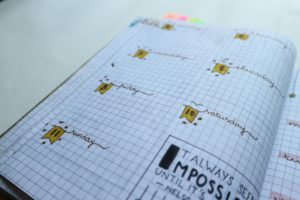Avoid COVID-19 Burnout

The amount of stress I feel at this moment can only be compared to a few of my previous life events – preeclampsia and premature birth, severe anaemia and a new-born in intensive care at a completely different hospital, moving overseas…all three times. I really struggle with uncertainty; it gnaws at me relentlessly. I’m also struggling to maintain a surface level of calm for my little people when I’m feeling churned up on the inside. The ever-evolving information on this virus and how we’re facing it as a country forces me to pivot and make or change decisions at a speed with which I am not comfortable. I’m emotionally exhausted.
There are many definitions of burnout. Here is just one that I feel describes what I’m feeling:
Emotional and physical exhaustion resulting from a combination of exposure to environmental and internal stressors and inadequate coping and adaptive skills.
My family is full of internal stress due to all the changes over the past week and we’re now trapped in a box together for an indeterminate amount of time creating new environmental stresses daily. We are the definition of burnout. And I am sure my family aren’t the only ones in this boat.
How do we avoid boiling over and burning out during this pandemic? How can we adapt or improve our coping mechanisms to thrive in this new situation?
Step 1: Accept that this isn’t home education
Only too recently we home educators railed against the ridiculous notion that home educated children were invisible, that they were locked away at home all day with no one to socialise with.
And now we’re locked away at home all day with no one to socialise with.

Our children’s schedules have been cleared – no field trips, workshops, playdates – and this may devastate some children. My children are usually emotionally solid, but they’re all out of sorts right now and they recognise it but can’t quite articulate it. They’re bickering more. They’re hugging me more. Mister Ten said to me, “I’m full of energy, but it doesn’t feel like good energy and I don’t know what to do with it.” Miss Seven is wound so tight she’s fighting and crying over every little thing. Mister Thirty-Something is irritable. He’s nit-picking. Things he would normally be too distracted or too tired to notice are now annoying and must be ‘fixed.’
A part of me, the introvert part of me, was looking forward to having more time at home to ‘dive deep’ and super-home ed! But I’m finding myself spending half my day cuddling and mediating now (and not just between the children). I’m making double the tea and we’re scarfing double the biscuits, whilst managing about half our normal workload as we did when our schedule was full. Who can home educate well under such circumstances?
This is not what home education looks like. We’ve been attempting to support others who have been thrust into this position of educating their own children, and the intentions are good, but let’s not forget that these are not the normal circumstances under which we would educate our own children. Before we offer more helpful home educating advice to parents whose children are now in the same boat, we must accept that we are also in the boat. And that boat is in uncharted waters.
Step 2: Assess your demands, control, and support
In 1979 Robert Karasek presented the Demand, Control, Support Model as a stress management tool for the workplace, but I think the model translates well to the job of home-management and all that entails in our current circumstances. In this model we have three options to help us prevent emotional exhaustion.
Demand: the requirements or stressors of our current situation
We can assess our perceived demands and either mitigate or eliminate them. Lucky for us, as home educators our demands are largely self-inflicted! Our demands might look something like:
- We’re required to feed our families.
- We are not required to feed them three hot gourmet meals per day (unless you find cooking cathartic). Reduce the demand on yourself and stick with your usual packed lunch of sandwiches, crisps and fruit (or whatever is available in your shop).
- We’re required to ensure the children make good
use of their time.
- WE are the only ones defining ‘good use of time’ right now. For me, this one looks less like home education and more like supporting the children in finding common ground instead of controlling each other.
- We’re required to keep the home in a liveable
state for everyone.
- But you don’t have to do this alone. Now is a good time to discuss with your children how to be a good housemate and how to practice those life skills that will stand your children in good stead when they’re off to university and living with strangers.
- We’re required to attend to our family’s
social-emotional wellbeing.
- We can reduce demands in other areas to meet this important demand
- Looking after ourselves, with quiet time or music or a book or more biscuits, IS an important part of meeting our family’s social-emotional need.
Control: the freedom to organise ourselves
There is a lot we do not have control over right now – like how frequently we can leave the house and where we can go when we do. But we do have control over our perspective.
- It may not be within our control to feed our families exactly what we would normally put in a packed lunch because the supermarkets are insane.
- But we can maintain the perspective that it needs to be quick and easy – subbing crisps for popcorn or trailmix or pots of yoghurt, subbing apples for fruit snacks or dried fruits or… fruit yoghurt!
- We can’t control how often we leave the house or where we can go
- We can take turns choosing a favourite walkable destination as our exercise for the day and enjoy it together, maybe with a nature scavenger hunt printable or a camera to make it special.
- We can’t control that our schedules have been cleared.
- We don’t have to give up our hobbies though. Miss Seven is following along with a YouTube ballet class during her usual ballet slot. Mister Ten is working on Scout badges during his usual Scout slot. And Mister Thirty-Something was gifted alone-time to practice his guitar parts on band night.
- We can also allow the children to make decisions about organising their own days. Maybe they’d like to sleep in. Maybe they’d like to start with TV. We have plenty of time to try all sorts of arrangements, like a science experiment.
Support: the structures in place that help us cope with demands
This is a tough one considering the nature of this crisis determines that we must stay at least 2m from just about everyone. On a bad home ed day we would normally have a cup of tea with a friend and commiserate, but we can’t right now. We may not be frontline staff or keyworkers, but we are caregivers and without our usual support systems we are susceptible to burnout. It is important to ask for help if we need it.

- Keep in touch with your friends.
- Texts are fine, phone is better, video chat with a cup of tea and a biscuit each is the best. Check in with each other, even if you’re having a good day, because your friends may not be and they may be too afraid to ask for support.
- Make it possible for your children to keep in
touch with their friends.
- Let the children encourage each other to make good use of their time. They can discuss books they’ve read which might spur your little person on to read something new. They can discuss new video games to try or new movies to watch or new projects to make and they will miraculously fill their own time.
- Check in with each other regularly.
- Dinner conversations may get real. Discuss what’s frustrating you. Problem-solve ways to improve living conditions in the short term.
Even Corona-clouds have a silver lining

Again, we’re all in the same boat, er, lots of little similar boats on the same choppy sea. And accepting that fact and problem solving from that foundation will help us to mitigate any potential emotional burnout as individuals, friends and neighbours. I’m looking forward to connecting with people who would normally fall outside of my social circle and supporting each other on common ground.
Despite the general tone of this post, I admit there have also been some benefits to being trapped in this box together. This morning Mister Thirty-Something and Mister Ten had time for an impromptu guitar lesson at 7 am – I’ve only been asking him to do that for years. I am sure we will discover other benefits if we keep our eyes open. Even corona-clouds have a silver lining.
Share your struggles and your silver linings with us on Instagram and we’ll support each other through this bumpy bit of the journey:
https://www.instagram.com/homeedvoicespodcast/